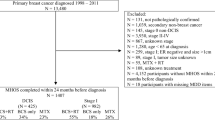Abstract
The objective of this study was to investigate the relationship between depression and screening for breast and cervical cancer. The study sample included Ontario female respondents to the Canadian Community Health Survey Cycle 1.2, Mental Health and Well Being component (2002). Women with Major Depressive Disorder (MDD) were identified based on the World Mental Health Composite International Diagnostic Interview and women with clinically significant depressive symptoms were identified using the Kessler 6-item Distress Scale (K6 ≥ 8). Respondents eligible for screening (N = 4,042 for cervical cancer and N = 1,403 for breast cancer) were linked to Ontario administrative data to prospectively ascertain screening outcomes. Both women with MDD and K6 ≥ 8 were less likely to receive breast cancer screening than their non-depressed counterparts (46.1% vs. 61.5% for MDD, Χ 2 = 5.47, p = 0.02; 49.9% vs. 61.9% for K6, Χ 2 = 6.61, p = 0.01). Adjusted analyses revealed persistence of the association between K6 ≥ 8 and breast cancer screening (adjusted odds ratio (AOR) 0.63, 95% CI 0.40–0.97). Neither MDD nor K6 ≥ 8 were found to be associated with cervical cancer screening in the full sample. A sub-group analysis by age revealed that women over age 40 years with K6 ≥ 8 were less likely to receive cervical cancer screening than their non-depressed counterparts (49.9% vs. 64.5%, X 2 = 6.47, p = 0.01). This association approached statistical significance in adjusted analysis (AOR = 0.65, 95% CI 0.41–1.04). This study’s findings suggest that attention to the uptake of preventive services in women with depressive symptoms is warranted.


Similar content being viewed by others
References
Aggarwal A, Freund K, Sato A, Adams-Campbell LL, Lopez AM, Lessin LS, Bonds DE (2008) Are depressive symptoms associated with cancer screening and cancer stage at diagnosis among postmenopausal women? The Women's Health Initiative Observational Cohort. J Women's Health 17(8):1353–1361
Ayuso-Mateos JL, Nuevo R, Verdes E, Naidoo N, Chatterji S (2010) From depressive symptoms to depressive disorders: the relevance of thresholds. Br J Psychiatry 196(5):365–371
Blackwell D, Martinez M, Gentleman J (2008) Women's compliance with public health guidelines for mammograms and pap tests in Canada and the United States. Women's Health Issues 18:85–99
Cairney J, Veldhuizen S, Wade TJ, Kurdyak P, Streiner DL (2007) Evaluation of 2 measures of psychological distress as screeners for depression in the general population. Can J Psychiatry 52(2):111–120
Fagiolini A, Goracci A (2009) The effects of undertreated chronic medical illnesses in patients with severe mental disorders. J Clin Psychiatry 70(Suppl 3):22–29
Fehringer G, Howlett R, Cotterchio M, Klar N, Majpruz-Moat V, Mai V (2005) Comparison of Papanicolou rates across Ontario and factors associated with cervical screening. Can J Public Health 96(2):140–144
Gentleman J, Lee J (1997) Who doesn't get a mammogram? Statistics Canada Health Reports 9(1):20–28
Haro JM, Arbabzadeh-Bouchez S, Brugha TS, de Girolamo G, Guyer ME, Jin R, Lepine JP, Kessler RC (2006) Concordance of the Composite International Diagnostic Interview Version 3.0 (CIDI 3.0) with standardized clinical assessments in the WHO World Mental Health surveys. Int J Meth Psychiatr Res 15(4):167–180
Harrell FE (2001) Regression modeling strategies: with applications to linear models, logistic regression, and survival analysis. Springer, New York
Hemminki K, Li X, Mutanen P (2001) Age-incidence relationships and time trends in cervical cancer in Sweden. Eur J Epidemiol 17(4):323–328
Kaida A, Colman I, Janssen PA (2008) Recent Pap tests among Canadian women: is depression a barrier to cervical cancer screening? J Women's Health 17(7):1175–1181
Kessler RC, Barker PR, Colpe LJ, Epstein JF, Gfroerer JC, Hiripi E, Zaslavsky AM (2003a) Screening for serious mental illness in the general population. Arch Gen Psychiatry 60(2):184–189
Kessler RC, Berglund P, Demler O, Jin R, Koretz D, Merikangas KR, Wang PS (2003b) The epidemiology of major depressive disorder: results from the National Comorbidity Survey Replication (NCS-R). JAMA 289(23):3095–3105
Lipscombe L, Hux J, Booth G (2005) Reduced screening mammography among women with diabetes. Arch Intern Med 165:290–295
McLachlin CM, Mai V, Murphy J, Fung Kee Fung M, Chambers A, members of the Cervical Screening Guidelines Development Committee of the Ontario Cervical Screening Program and the Gynecology Cancer Disease Site Group of Cancer Care Ontario (2005) Cervical screening: a clinical practice guideline
Nicholson A, Kuper H, Hemingway H (2006) Depression as an aetiologic and prognostic factor in coronary heart disease: a meta-analysis of 6362 events among 146 538 participants in 54 observational studies. Eur Heart J 27(23):2763–2774
Ontario Breast Screening Program (2010) Breast Screening. http://www.cancercare.on.ca/obsp. Accessed January 28, 2010
Patten SB, Williams JVA, Lavorato DH, Eliasziw M (2009) The effect of major depression on participation in preventive health care activities. BMC Public Health 9:87
Pirraglia PA, Sanyal P, Singer DE, Ferris TG (2004) Depressive symptom burden as a barrier to screening for breast and cervical cancers. J Women's Health 13(6):731–738
Ringash J, Canadian Task Force on Preventative Health Care (2001) Preventative health care 2001 update. Can Med Assoc J 164(4):469–476
Statistics Canada. (2002). Canadian community health survey, mental health and well-being cycle 1.2 master file documentation. http://www.statscan.com. Accessed January 28, 2010
Stecker T, Fortney JC, Prajapati S (2007) How depression influences the receipt of primary care services among women: a propensity score analysis. J Women's Health 16(2):198–205
Upshur R, Wang L, Maaten S, Leong A (2006) Ch. 5: patterns of primary care and prevention. In: ICES Atlas: Primary Care in Ontario, pp 79–90
Vigod SN, Stewart DE (2006) Major depression in female urinary incontinence. Psychosomatics 47(2):147–151
World Health Organization (2010) Depression. http://www.who.int/mental_health/management/depression/definition/en/. Accessed October 22, 2010
Acknowledgments
Dr. Vigod was supported in this work by a Research Fellowship Training Award from the Ontario Mental Health Foundation in Toronto, Ontario. Dr. Vigod had full access to all the data in the study and takes responsibility for the integrity of the data and the accuracy of the data analysis.
This study was supported by the Institute for Clinical Evaluative Sciences (ICES), which is funded by an annual grant from the Ontario Ministry of Health and Long-Term Care (MOHLTC). The opinions, results, and conclusions reported in this paper are those of the authors and are independent from the funding sources. No endorsement by ICES or the Ontario MOHLTC is intended or should be inferred. In addition, support to the Centre for Addiction and Mental Health for the salary of scientists and infrastructure has been provided by the Ontario Ministry of Health and Long Term Care. The views expressed here do not necessarily reflect those of the Ministry of Health and Long Term Care.
We would like to thank Dr. Lawrence Paszat and Mr. Refik Saskin for their invaluable advice and input into the work represented by this manuscript.
Author information
Authors and Affiliations
Corresponding author
Rights and permissions
About this article
Cite this article
Vigod, S.N., Kurdyak, P.A., Stewart, D.E. et al. Depressive symptoms as a determinant of breast and cervical cancer screening in women: a population-based study in Ontario, Canada. Arch Womens Ment Health 14, 159–168 (2011). https://doi.org/10.1007/s00737-011-0210-x
Received:
Accepted:
Published:
Issue Date:
DOI: https://doi.org/10.1007/s00737-011-0210-x




